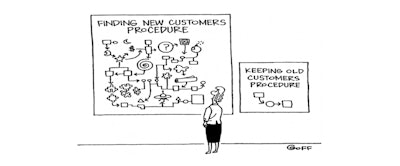
Organizations are obsessed with new business. Sales managers tell their salespeople, “Go out there and find new business” or “Sign X number of new accounts this quarter.” Salespeople focus on new business and ignore their greatest growth opportunity — their existing customers. The best (and easiest) way to grow is to focus on your existing customers.
Salespeople focus on new prospects when they think there are no opportunities to grow their existing customers. Consider this example from a salesperson in a recent seminar. This salesperson was challenged by his manager to sell more to his top customer.
The salesperson explained, “My sales manager challenged me to grow one of my top accounts. I explained to my manager that I was already getting all the business I could. My manager then made a joint call to this account. While on the call, my manager flipped through the catalog and asked the customer, ‘Did you know we also sold these items?’ The customer responded, ‘I had no idea you sold all of this. We buy tons of this stuff.’” The sales manager made his point.
Too often, salespeople fail to grow an opportunity because they’re unaware of the potential. You can’t grow an account if you don’t believe there are growth opportunities. Think of how many opportunities are missed by not knowing.
Other salespeople miss opportunities because they don’t clearly understand their customer’s business or industry. If you don’t understand your customer’s industry, how could you understand opportunities in their industry? Industry knowledge is critical. In fact, our research on top-achieving salespeople revealed that knowledgeable expertise is the No. 1 attribute customers look for in a salesperson.
Tony Robins, entrepreneur, author and speaker, famously said “If you are not growing, you’re dying.” This quote applies to several aspects of business, but especially sales.
Some salespeople are satisfied with the status quo. For these salespeople, complacency has set in. They have reached the sales plateau. They no longer pursue new opportunities. They don’t want to “rock the boat.” They’re happy with what they have.
In any case, the end result is the same — missed opportunities. However, an opportunity missed is an opportunity gained… for your competition.
These missed opportunities are opportunities to create more value for the customer. If you are not creating enough value for your customer, your competition probably is. Your best customers represent your greatest opportunity to grow. Use these ideas to fully realize your growth potential with existing customers.

Identify New Problems To Solve
In a recent Reilly Sales Training study, top-achieving salespeople said the most effective way to sell more to existing customers is to find new problems to solve. However, top-achievers don’t sit around and wait for problems to surface, they find them. The best salespeople are professional moles. They burrow their way into an organization and relentlessly search for problems to solve and opportunities to create value.
When hearing “problem solver,” I’m always reminded of a salesperson I worked with that branded himself as such. He would end every sales call asking his customers the same question, “What other problems are you experiencing that I can help with?” Customers would eventually go to this salesperson for every problem they experienced. He helped when he could and recommended trusted partners for other problems. He was the first call. That’s the power of solving problems.
Meet More People
Each new decision maker represents an opportunity to grow your business and bond the customer to your organization. Too many salespeople leverage opportunities by asking themselves, “What other projects can I quote?” Instead they should ask themselves, “What other relationships can I build?”
Meeting more people will naturally create more opportunities. Each new person might not have purchasing authority, but they have information. Too often, sales organizations focus on a growth target for existing customers. What if you established a relationship target instead? A relationship target provides you with a longer-term goal. Also, each relationship you build makes it harder for your competition to burrow their way in. Creating more relationships adds another level of protection.
Find Leveraging Points
In a recent study, we asked top-achieving salespeople the following question. “Think of your largest revenue-producing customer. Can you recall a single event or action that had substantial impact on achieving success within this account?” Sixty-five percent of top-achievers can recall such an event. These events are called leveraging points.
Leveraging points help you achieve maximum performance with minimum effort. To identify your leveraging points, analyze your greatest sales successes. Greatest successes can mean anything: order size, profitability, number of product lines, etc. When analyzing these successes, ask yourself what the key events were that led to this success. After identifying these key events, look for these leveraging points in your current opportunities. Leveraging points will help you do more with less.
 Paul Reilly, President of Reilly Sales Training
Paul Reilly, President of Reilly Sales TrainingLook at your existing opportunities for growth. Your existing opportunities are your easiest and most profitable ways to grow. As you grow an existing customer, the cost to serve that customer goes down and profit goes up. However, you can’t grow an opportunity until you believe there is an opportunity to grow.
A salesperson’s mindset can be the limiting factor. For some salespeople, it’s easier to think they have reached their full potential than to find opportunities to grow. These salespeople need to embrace a new mindset.
If complacency has set in, take the attitude of a beginner. Shunryu Suzuki, the famous Zen monk and teacher, said, “In the beginner's mind there are many possibilities. In the expert's mind there are few.” What if you viewed your existing customers through the eyes of a beginner? Imagine the possibilities.
Paul Reilly is president of Reilly Sales Training, a St. Louis-based privately-owned company that specializes in training sales professionals, sales managers and service professionals. Call Paul at 636-778-0175 or email him at [email protected]























